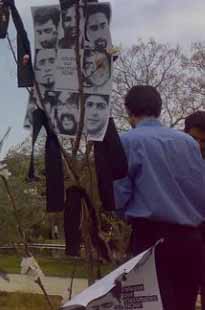| Home > 30 years human rights in Iran > Articles of the Universal Decleration of Human Rights > An interview with journalist and researcher Abbas Abdi | |||
An interview with journalist and researcher Abbas Abdi An interview with journalist and researcher Abbas Abdi By Ardavan Roozbeh a.roozbeh@radiozamaneh.comIn an interview conducted by RADIO ZAMANEH, Abbas Abdi, the prominent reformist journalist and researcher, discusses human rights violations in Iran. Q. What types of human rights violations occur in Iran that are also common throughout the world? Are such violations systematic in your view? A. Human rights, as defined in the Universal Declaration of Human Rights, is not observed in Iran. In fact, the government and the Islamic system officially do not recognize it. Prior to the 1979 revolution, Iran had signed the declaration but ignored it in practice. Post-revolution, the clerical system and the Guardian Council officially rejected its tenets. However, there are parts of the declaration that the Islamic system does recognize, on paper. Like many other developing countries though, it doesn’t observe it in practice. Q. Isn’t it contradictory to say that on the one hand we respect international law, human rights and its various international charters, but on the other hand, we reject many of its covenants for not being in line with Sharia (Islamic law)? A. Signing the Universal Declaration of Human Rights and other international charters of course dates back to the Pahlavi monarchy. The truth is that the clerical leadership and the Guardian Council do not accept human rights as defined internationally. They have fundamental ideological and religious problems with it. Their official line is that 'we accept it conditionally,' which is another way of saying 'we don’t accept it.' This is indeed a contradiction as you correctly point out, but it is not limited to this particular sphere. There is a massive clash between modernism and 21st century values and realities on the one hand, and traditional Islamic values and beliefs on the other. These contradictions are irreconcilable and the ruling establishment is unable to solve it. Q. Do you believe Iranians are aware of their civil and other rights as citizens? A. It is not just a matter of reading or studying something. Aside from political rights, most citizens in the country aren’t even informed about their rights when it comes to family, inheritance and divorce law. In my view, the social structure in our country has not yet reached a level where “human rights” -- the way it is defined in advanced countries -- can be implemented. Also, it comes out of necessity. Let me clarify. For example, women of today demand a set of rights that they deem absolutely essential. Because they feel the need for it, they deeply believe it is their right.
Abbas Abdi, journalist and researcher Q. However, there are times the Islamic Republic acts and sounds as if it doesn’t care what the international community and the rest of the world thinks. A. Some of the resistance and opposition by the Islamic system to the values expressed and promoted by international charters and declarations are rooted in religion and some of it is political. In many instances, they feel if they back down on this issue they might be put in a position were they have to backpedal on everything else. But there are issues on which they have retreated. Usury is strictly forbidden in the Quran and under Sharia Law but we have seen it practiced for the last 30 years and it is a well established norm in the business community, in banks and among citizens. Therefore, it isn’t that the clerics in charge are completely inflexible. It depends on the issue. For instance, the reason they fiercely resist women’s rights is due to the misogynistic attitude of many of them and the fact that they believe men are superior to women. The bottom line is that the basis of their resistance is bias and prejudice and has nothing to do with sound arguments and rationale. I strongly believe the longer this goes on, the more dangerous it is for Iranian society. If the government gives in – even just a little – socially, politically and where Sharia is concerned, it will go a long way in relieving tensions between various sectors of society and the ruling establishment. The more prolonged the clerical system’s resistance to change, the louder and angrier the voices and demands of the civil society will become. |
|||
 |













